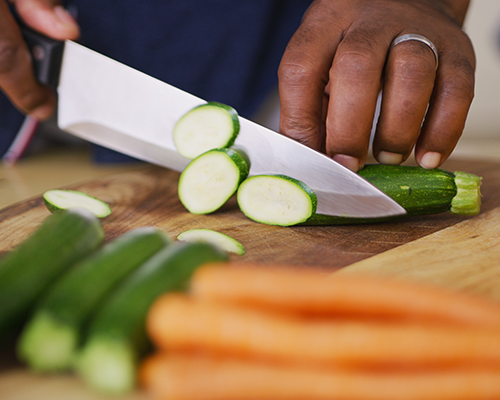
Dining out certainly has its advantages—a wide variety of menu options, no chopping or sautéing and zero cleanup to name a few. But dining in has advantages, too. You probably know that cooking at home can be better than ordering out for both your wallet and your waistline. But did you know that cooking gout-friendly meals at home may also reduce your risk of flares?
The connection between food and gout flares
For centuries, diet was believed to be the primary cause of gout.1 However, recent research has shown that heredity plays a bigger role in the risk of gout attacks than diet.2,3 Nonetheless, your food choices may still impact your risk of flares, as some foods are more likely than others to trigger painful attacks.4 Red meat, organ meats, certain types of seafood and beer are among the most well-known culprits.4
Foods and drinks to enjoy if you have gout
Purines are chemical compounds that occur naturally in our bodies and also are present in some foods and beverages.5 Uric acid is produced when the body breaks down purines.5 If you have gout, it’s best to eat gout-friendly meals that include mostly lower-purine foods.5 Consider adding these to your grocery list6,7:
- Lean meat and poultry
- Low-fat dairy products
- Whole grain products
- Beans/legumes
- Nuts and seeds
- Fruits (there is some evidence that eating cherries is associated with a lower risk of gout attacks)
- Vegetables
Foods and drinks to avoid if you have gout
As you plan gout-friendly meals to cook at home, it’s important to keep in mind that some foods and drinks are associated with a higher risk of gout attacks than others.5 The next time you go to the grocery store, do your best to steer clear of these items6,7:
- Red meat and organ meats (eg, liver, tongue, sweetbreads)
- Shellfish (eg, shrimp, lobster)
- Refined carbohydrate products (eg, white bread, white rice, pasta, sugar)
- Processed foods (eg, chips, snack foods, frozen dinners)
- Sugary/sweet beverages
- Alcoholic beverages
Gout-friendly recipes to try
Use your favorite Internet search engine to discover lower-purine recipes that are appropriate for people with gout. One source is the list of gout-friendly recipes on the Johns Hopkins Medicine website. There you’ll find dozens of delicious, easy-to-prepare dishes that everyone can enjoy—regardless of whether or not they suffer with gout.
Important tips for managing gout
In addition to eating a low-purine diet, there are many things you can do to take good care of yourself as you manage your gout:
- Drink plenty of water—Drinking at least 8 glasses of water each day helps flush uric acid from your system.8
- Maintain a healthy weight—Losing weight (if you need to) may help reduce the amount of uric acid in your bloodstream.9 (Avoid rapid weight loss or fasting, however, as these may temporarily increase your uric acid level.9)
- Take medications as directed—According to the Mayo Clinic, medication is often the most effective way to treat gout and prevent flares.10
- Visit your doctor regularly—Take an active role in your care by seeing your doctor as scheduled and following your treatment plan.4 This especially important if you have other medical conditions such as heart disease or diabetes.4
Gout Friendly Diet Cheat Sheet
Discover the benefits of a gout-friendly diet that may reduce your risk of future flares.
INFOGRAPHIC
NOTE: This article was not written by a medical professional and is not intended to substitute for the guidance of a physician. These are not Hikma’s recommendations for gout flare prevention, but rather facts and data collected from various reliable medical sources. For a full list of resources and their attributing links, see below.

